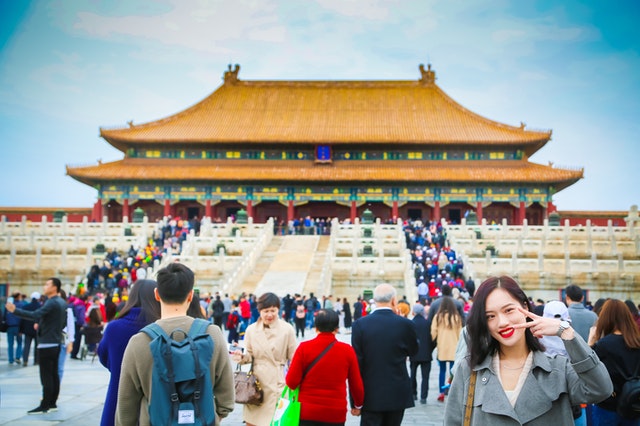Essential Chinese Phrases For All Occasions
Are you planning an adventure trip to the Yellow Mountains? Do you want to reconnect with a Chinese family member? Do you just want to be able to greet your Chinese colleagues in their language in your next conference call?
No matter what your reason is for wanting to learn Chinese, you’ve come to the right place. Though we can’t deny that Mandarin Chinese is one of the most difficult languages in the world, we want to show you that with a few essential Chinese phrases you can go a long way to help you make more satisfying interactions and experience Chinese culture in a more meaningful way.
Table of Contents
→Sign Up Now: Free Chinese Lesson With a
Native Teacher!←
Are you already shaking at the idea of a list full of unknown Chinese characters? Don’t worry, we’ve got your back.
For every Chinese expression on the list, we will provide both Chinese letters and a Romanized version that will tell you how to pronounce each phrase. In other words, you have no excuses! So let’s get started.
Chinese Greetings
Like in any language, a good conversation in Chinese should start with a proper greeting. While you can always use “Hello!”, there are more specific greetings that you can choose from depending on the time of day.
1. 你好 –!Nee haow! – Hello
2. 你好吗? – Nee haow ma? – How are you?
3. 很好 – Hun haow – Good
4. 不太好 Boo tye haow – Not so good
5. 早上好 Dzow zhung haow – Good morning
6. 晚上好 Wun zhung haow – Good evening
7. 晚安 Wun-un – Good night

Chinese Phrases For Socializing
Once you arrive in China for a holiday or a business trip, don’t let linguistic or business etiquette differences make you shy. Chinese people may dress and speak differently, but they are very polite and very used to answering questions from tourists.
Besides, don’t you find that connecting with locals is the best way to get wonderful recommendations that you wouldn’t normally find in a brochure or a travel blog?
Here are a few Chinese phrases you can use to interact with a native Chinese speaker.
8. 你叫什么名字?– Nee jaow shun muming dzi? – What is your name? (Informal)
9. 我叫 – Wor jyaow – My name is…
10. 您贵姓?– Neen gway shing – (Formal) What’s your last name?
11. 我姓 – Wor-shing – My last name is…
12. 你多大?– Nee dworda? – What's your age?
13. 我三十岁 – Wor sun shrr sway – I’m thirty (years old)
14. 你来自哪里?– Nee lye dzrr na lee – Where do you come from?
15. 我来自中国 – Wor lye dzrr yong gwor – I come from China
16. 很高兴认识你 – Hun gaow shing run shrr nee – Nice to meet you
Common Chinese Phrases to Express Politeness
As human beings, it is only natural to want people to like you –especially when we’re so far from home! The Chinese phrases below will make your exchanges more civilized and will let people know that you’ve made a huge effort to be polite even when your inner Chinese vocabulary bank is still in development.
17. 谢谢!– Shyeah shyeah! – Thank you!
18. 非常感谢!– Fay chung gun shyeah! – Thank you so much!
19. 不用谢 – Boo yong shyeah – You’re welcome (“no need to thank me”)
20. 不客气 – Boo kuh chee – You’re welcome (“you needn’t to be so polite”)
21. 不好意思 – Boo haow yee srr – Excuse me (Use this phrase to get past someone in the street, to get someone’s attention, and for a casual apology)
22. 对不起 – Dway boo chee– Sorry (A more heart-felt apology)
23. 麻烦你了– Ma fun nee luh – Can I bother you for a second?
24. 请问…? – Cheeng wun? – Could I ask…? (A formal way to introduce a question)
25. 没问题 – May wun tee – No problem
26. 好的!– Haow duh! – OK!
Useful Chinese Phrases to Use When You’re Lost In Translation
No matter how much effort we put into our Chinese lessons, there may come a time in which we need to ask for linguistic assistance during our stay in China. Remember: it’s better to admit that you don’t understand something rather than make a guess and create a big confusion.

So, next time your Chinese skills falter, don’t just nod and smile. Instead, use these Chinese phrases to ask for help.
27. 你 听得懂吗?– Nee teen duh dong ma? – Do you follow what I’m saying?
28. 我)听不懂!– Wor teen boo don – I don’t understand!
29. 可以说得慢 一点吗?– Kuh yee shwor duh mun yee dyen ma? – Could you speak more slowly?
30. 你会说英文吗?– Nee huai shwor jeeng wun ma – Can you use English?
31. 我 不会说中文 – Wor boo huai shwor jong wun – I don’t speak Chinese
32. 可以说得慢一点吗?– Kuh yee shwor duh mun yee djen ma? – Can you say that more slowly?
33. -------- 什么意思?– shun muh yee si – What does ------ mean?
34. -------- 怎么说?– dzun muh shwor – What is the word for -------?
Chinese Phrases to Ask For Directions
It’s no secret that apps like Google Maps can help you find the place where you want to go, anywhere in the world. But let’s face it: there is no such thing as a never-failing app, especially when you need to enter strange place names in an unknown language into it to make it work. Besides, as our Chinese teacher Huang has just reminded me, Google services don’t even work in mainland China. For these reasons, it’s ultimately easier to do things the old-fashioned way and just ask a local.
35. 到__怎么走?Dào ___ zěnme zǒu? Daow __ dzun muh dzoh – How can I get to the __?
36. 不好意思,可以问个路玛? Boo hao yee srr, ku yee wun guh loo ma – Excuse me, could I ask you for some directions?
37. __在哪儿? __dzye narr – Where is the __?
38. __在那儿/__在那里 __zay naar – The __ is over there.
39. 在这儿 Dzye jurr – You’re here.
40. 直走 jrr dzoh – Walk straight ahead
41. 右转 Yoh jwu – Turn right
42. 左转 Dzwor jwun – Turn left
43. 过马路 Gwor ma loo – Cross the road
44. 我要去__ Wor yaow choo__ – I need to go to __ (You can also use this Chinese phrase in a taxi or when buying a ticket).
Easy, right?
No? Okay, okay. If you still think you will feel more at ease knowing you can resort to an app, Huang tells me you can install the local alternative: Baidu Maps.
Essential Chinese Business Phrases
China may have some of the most beautiful landscapes in the world, but its natural beauty is not the main reason why so many people travel to Beijing and Shanghai every year. Being one of the biggest economies in the world, China is also a mecca for business people and entrepreneurs. If you’re travelling to China for business purposes or there’s an online conference with Chinese investors you can’t stop worrying about, make sure you write down these useful Chinese phrases:
45. 我很高兴地告诉你... – wǒ hěn gāo xìng de gào sù nǐ… – I am delighted to inform you that…
46. 恭喜您... – gōng xǐ nín… – Congratulations on your…
47. 我对这份提案没意见。– wǒ duì zhè fèn tí àn méi yì jiàn . – We are fine with the proposal.
48. 我们的新系统有些问题。– wǒ men de xīn xì tǒng yǒu xiē wèntí – There are some issues with our new system.
49. 我恐怕要带来一些坏消息。wǒ kǒng pà yào dài lái yī xiēhuài xiāo xī – I have some bad news, I am afraid.
50. 由于情况超出我们所能控制... – yóu jú qíng kuàn chāo chū wǒ men suǒ néng kòng zhì… – Due to circumstances that we can’t control...
51. 关于……,我觉得不太乐观 guān yú…, – wǒ jué de bú tài lè guān – I don`t have a good feeling about…
52. 我们很难接受... – wǒ men hěn nán jiē shòu… – It would be hard for us to accept…
53. 希望我们之间友好的业务关系得到进一步的发展 – xī wàng wǒ men zhī jiān yǒu hǎo de yè wù guān xì dé dào jìn yī bù de fā zhǎn - We look forward to continuing our pleasant business relations.
54. 我会很感激你如果可以… – wǒ huì hěn gǎn jī nǐ rú… – I could appreciate it if you could…
As you can see, breaking Mandarin Chinese into digestible, functional chunks is a nice way to turn one of the scariest languages in the world into an approachable task.
→Sign Up Now: Free Chinese Lesson With a
Native Teacher!←
However, if you want to go beyond Chinese phrases and you want to work on your fluency, you will need much more than a blog. At Listen & Learn, we work with native Chinese teachers like Huang who can provide a friendly, stress-free environment for you to exercise your speaking abilities. Contact us now and we’ll match you with one of our best tutors for a free trial lesson, with no strings attached! Not ready to start just yet? No worries. Just send us a quick message and we’ll tell you more about our tailor-made courses.


